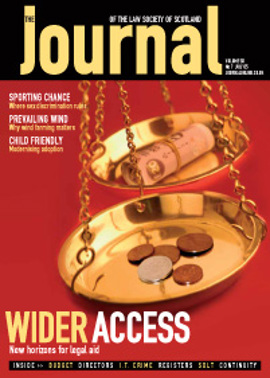Commissioner: Public Authorities must do more
It is now more than five months since the Freedom of Information (Scotland) Act 2002 came into force, and many public authorities are struggling to cope with the increased workload generated by a knowledge-hungry public keen to take advantage of their new legal right to publicly-held information.
This is partially because the number of people choosing to make requests under the new legislation has vastly exceeded expectation. The Scottish Information Commissioner had predicted that, in his role as the official regulator of the Act, he would receive between 200-300 appeal applications in 2005, whereas in fact he had already received nearly 200 by the beginning of May. These being the cases where the requester has been unhappy with both the public authority’s initial response and their review of that response, these numbers will only represent the tip of the iceberg.
In addition to the practical problems posed by compliance, there has been widespread confusion and disparity over the Act’s various exemptions under which public authorities can choose not to supply information. With this in mind, the Commissioner’s recent first decision provides useful guidance on what must be done to comply with the Act.
The case concerned a driver who asked Lothian & Borders Safety Camera Partnership for a copy of the calibration certificate of a speed camera they operated. The request was initially refused, and although subsequently complied with, the applicant still sought a decision from the Commissioner on the handling of the request.
Rather than only considering the specific facts of the case, the Commissioner helpfully chose to generally address the two main issues raised. These were whether the exemption that information is “otherwise accessible” can be relied upon if the information is available online, and procedurally what an authority must do in handling a request.
In deciding whether information on a website ought to be considered “reasonably accessible”, the Commissioner looked to recent statistics on the use and availability of the internet in Scotland, noting that apparently only 45% of adults make use of the internet for personal use. He went on to point out that even this figure cloaks wider disparities, pointing out that the proportion falls to 27% for single parents, and pensioners barely register, with a mere 3% having internet access.
From this he came to the conclusion that “it is not yet possible to say that information which is solely provided on a website is reasonably accessible to people in Scotland”. He went on to clarify that, even if information is otherwise accessible, public authorities should still provide it in the format requested, unless the cost of doing so is prohibitive.
Unsurprisingly, given that it was the principal reason for the applicant’s appeal, the manner in which the Partnership had dealt with the request was criticised by the Commissioner on various points.
In first refusing to supply the information, they both failed to cite on what basis they were doing so and failed to inform the applicant of his right to have that decision reviewed. In spite of this, the applicant did request to have the request reconsidered. On this matter, the Commissioner clarified that a general suggestion that a decision is unsatisfactory should be treated as a request for review, a point public authorities would do well to note, as they will require to have effective systems and training in place to ensure that review requests are properly identified.
The Commissioner was also critical of the fact that the review decision was sent out in the name of the same officer who had issued the initial refusal, which he felt could be indicative of a less than impartial decision.
There is little doubt that the Act has been a thorn in the side of public authorities, and many are struggling to cope with demand, particularly the legal deadline of providing the information requested within 20 working days.
It has to be said that some local authorities are bending over backwards to comply with their duty to advise and assist applicants with their information requests. However, others are not and the Commissioner’s ruling should help to focus their minds on the exact nature of their freedom of information obligations.
In this issue
- Commissioner: Public Authorities must do more
- Supporting legal aid
- No country cousins
- Making the money go further
- Adopting a new approach
- Gordon giveth and Gordon taketh away
- A blow for the future
- A Wie hint of change?
- Raising the bar
- The IT crimewave
- The directing mind
- Going through the motions
- Planning in the park
- Always look on the bright side
- Scottish Solicitors' Discipline Tribunal
- Website reviews
- Book reviews
- The race to the registers revisited
- SDLT: getting it right
- SDLT: barcoding
- Business sense






